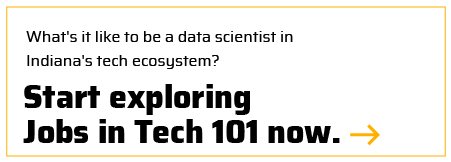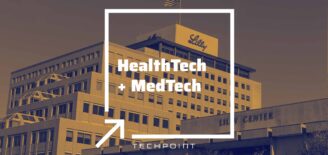Meet Zachary Cardwell, Data Scientist at Springbuk
Employer: Springbuk
Job Title: Data Scientist
Degree Path: Bachelor of Science, Purdue University
Hometown: Indianapolis, IN
Current City: Indianapolis, IN
What led you to your getting into tech and this occupation? What was your first job in tech?
I’ve always been fascinated by applying math and the scientific method to real, practical problems. My first real job in tech was as an IT Analyst.
What has been your career path so far?
I got my start in the grocery business as an IT analyst, eventually finding myself on projects like supply chain efficiency and process improvement. After a few years of that, I jumped into the consulting business, then into the wider startup world. So far I’ve worked in retail, government, finance, real estate, digital marketing, and healthcare.
When you think of a day in your life, what are the main work activities you do or responsibilities you have?
A large majority of my day is testing and developing algorithms to predict disease with data. I also lead the efforts to implement these methods in the wider Springbuk application, while also occasionally being involved in sales and customer calls.
Help us picture your work environment.
My work environment is basically anywhere that I have a notebook ready and a pen to write with. I interact a lot with my colleagues at the office, with frequent meetings during the day with all levels of the company.

What do you love about the work you do?
I love the challenge of invention required for this work. Unlike many areas in software development, there are rarely “solved problems” in this field and certainly not many obvious paths to pursue. Nothing is more exciting than finding an elegant answer to a difficult problem.
Which personality traits, interests, and abilities are important or common for a person to succeed in and enjoy this occupation?
You have to love solving problems to succeed in this job. Data science often requires long hours, lots of thinking, and a willingness to fail. There are no easy roads to success and frequently your favorite ideas or methods are wrong- you have to be willing and happy to accept that.
Which tools/technologies or technical skills are particularly important for a person in your job to be proficient in?
A deep, intuitive understanding of mathematics is key to data science. In general, you’ll have to have at least a mathematics minor if not a mathematics major. Most of the data scientists positions today require either R or Python with a decent familiarity with SQL. It’d be useful to be familiar with a NoSQL database too.
Which soft skills (aka general business skills or employability skills) are particularly important for a person in this occupation to be proficient in?
A data scientist is frequently viewed as a leader, no matter where they fall in the organizational chart. You will need to be able to effectively communicate and explain your ideas and help guide their implementation. Managing expectations and being honest with results is central to establishing trust within an organization.
From your experience with new grads applying for and beginning jobs in this occupation, are they missing any particular knowledge, skills, or experiences that hold them back? Please describe.
Data science is typically considered a more senior position in organizations and with that, if you’re a new grad coming to this field you have to show demonstrable experience doing this sort of work. Try to volunteer and intern in an analytic capacity and have actual results and experiences to talk about on your resume. Never put things on your resume like specific algorithms unless you have coded them from scratch and understand the assumptions and pitfalls thoroughly. Be comfortable with saying you don’t know something when you don’t.
What encouragement or advice would you offer to others considering this occupation or wanting to stand out amongst others?
It might take a while to break into the data science field, no matter what your background is. As you pursue this career path, try and find data science problems wherever you can. Develop your own techniques, methods, and then test these as best you can with experiments. This will help you build your resume and you’ll learn quite a bit about the field along the way.




